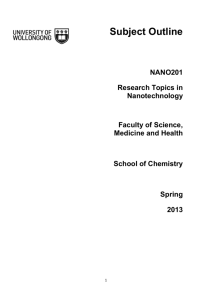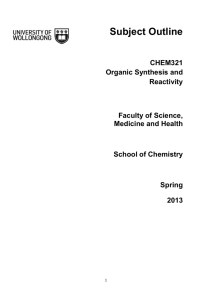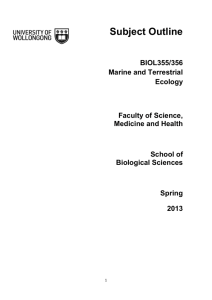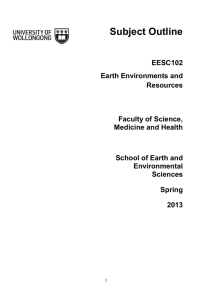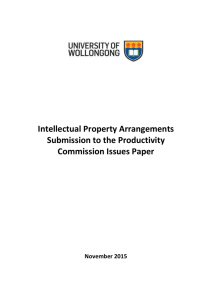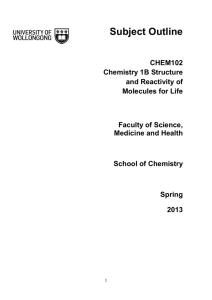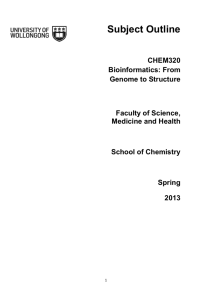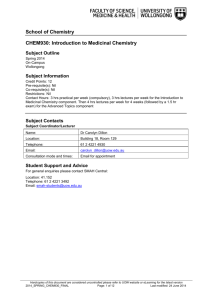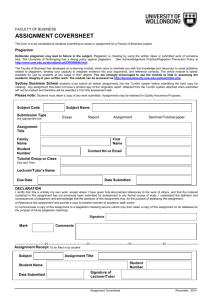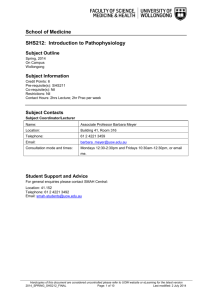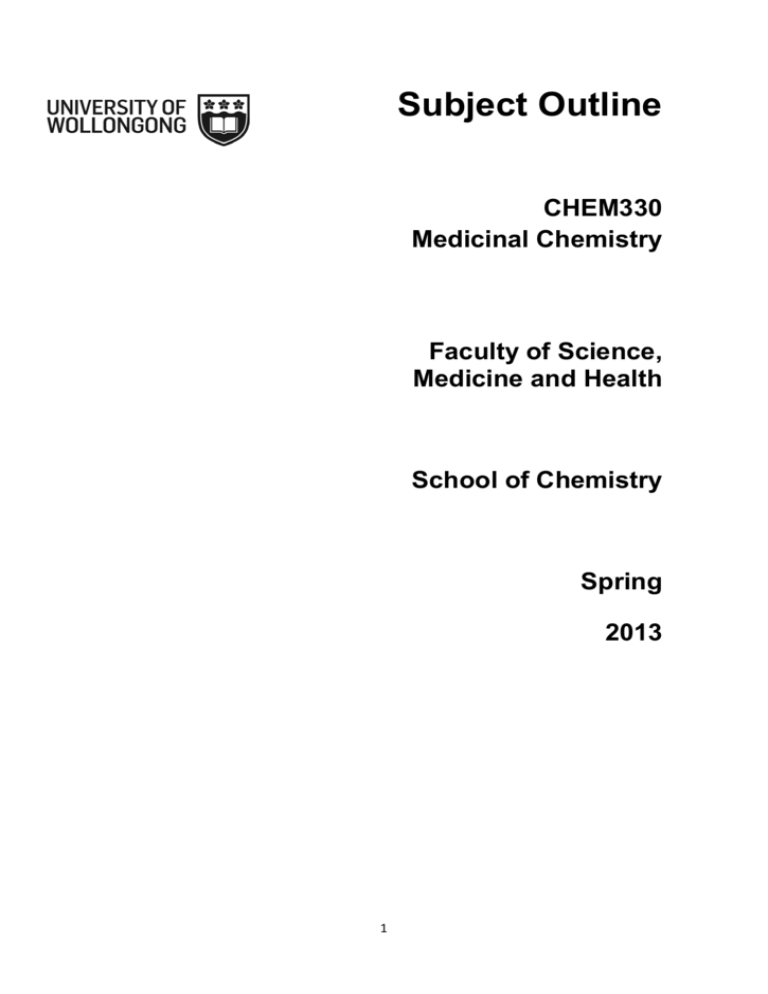
Subject Outline
CHEM330
Medicinal Chemistry
Faculty of Science,
Medicine and Health
School of Chemistry
Spring
2013
1
Subject Outline
Subject code:
CHEM330
Subject name:
Medicinal Chemistry
Credit points:
8
Pre/co-requisites:
CHEM212 and BIOL214 and SHS 211. Entry restricted to
BMedChem candidates.
Mode of delivery:
On Campus
Delivery location:
Wollongong
Version history
2nd edition
Dr Carolyn Dillon – Faculty of Science, Medicine and Health, UOW
st
1 edition
Dr Carolyn Dillon, Faculty of Science , UOW
© University of Wollongong 2013. All rights reserved.
2013
2012
Copyright and Disclaimer
No part of this work may be reproduced without the prior written consent of the University of Wollongong. All requests and
enquiries should be directed to the Vice-Principal (Administration), University of Wollongong, Northfields Avenue, Wollongong
NSW 2522 Australia. Within Australia telephone (02) 4221 3920; international +61 2 4221 3920.
http://www.uow.edu.au/about/disclaimer/index.html
The University of Wollongong attempts to ensure that the information contained here is correct at the time of production,
however, sections may be amended without notice by the University in response to changing circumstances or for any other
reason.
2
Contacts
Subject Co-ordinator
Name:
Dr Carolyn Dillon
Faculty of Science, Medicine and Health
Location
41.152
Telephone
Email
61 2 4221 3492
smah_student_enquiries@uow.edu.au
Consultation mode and times:
_________________________________________________________________________
Lecturers
Office
Dr Carolyn Dillon
18.129
Phone
Email
Consultation
times
x4930
carolynd@uow.edu.au
Tues: 1.303.30 pm
x5085
mkelso@uow.edu.au
x4286
sralph@uow.edu.au
x4692
keller@uow.edu.au
(subject Coordinator)
Dr Michael Kelso
18.115
A. Prof. Stephen Ralph
18.226
A. Prof. Paul Keller
18.222
Dr Jody Morgan
TBA
3
TBA
TBA
TBA
Subject Information
Outline
This subject covers chemical aspects of the design, physiological activity and metabolism of
therapeutic/diagnostic drugs. The theoretical component covers: cellular targets for drug
action (theoretical aspects and case studies), an overview of approaches to drug discovery,
structure activity relationships and computer aided methods physicochemical properties and
drug action, stereochemistry/chirality and drug action, drug metabolism, drug resistance,
pro-drug strategies and organic and inorganic medicinal agents. In addition, a guest lecturer
from a pharmaceutical company will give a 2 hour lecture on current issues and strategies
for successful drug design, research and marketing.
The course also includes a 13-week (3 hour per week) compulsory laboratory component
which involves organic synthesis (combinatorial peptide synthesis, chymotrypsin inhibitor
synthesis and sulphonamide synthesis), characterization techniques (NMR, UV/Vis, mass
spectrometry, infrared spectroscopy), enzyme inhibition studies, and anti-bacterial testing.
In the final weeks the student will also perform a mini-project whereby they design and
implement practical experiments to solve a medicinal chemistry problem (which will be
written up as a report).
Learning Outcomes
Through successful completion of this subject students will have gained:
(i)
(ii)
(iii)
Knowledge and understanding of the theoretical components of the course
Competency in experimental report writing
Ability to work collaboratively in a group
(iv)
Laboratory skills (synthesis, interpretation of characterization spectra etc.)
(v)
Computer aided modelling skills
(vi)
(vii)
The ability to design, develop, execute and report a research project
Knowledge and execution of safe work procedures
(viii)
Experience in seminar presentation
Faculty Graduate Qualities
Valuable qualities gained by UOW graduates are essential for gaining employment and
making an important contribution to society and their chosen field – further information is
available at http://www.uow.edu.au/about/teaching/qualities/
Engagement in this subject will contribute to each student’s development of the following
UOW Graduate Qualities:
Informed
•
Comprehensive knowledge of an area of Science and well-developed skills in using
relevant technologies
4
•
Awareness of the international context in which advances in Science are made and
applied
Independent learners
•
•
Critical thinking skills
Scientific approach to the acquisition, analysis, and interpretation of data
Independence in seeking to extend knowledge through ongoing research, enquiry and
reflection
•
•
Problem solvers
Application of creative, logical and critical thinking to scientific problems
Effective communicators
•
•
Well-developed written, oral & aural communication
Effective collaboration and teamwork across a range of settings and cultures
Responsible
•
•
Ethical decision making
Respect for diverse opinions, professions, and cultures
Lecture/Tutorial/Laboratory Times
Refer to http://www.uow.edu.au/student/timetables/index.html for an up-to-date timetable.
Lectures: Monday 8.30-9.30 am, Tuesday: 9.30-11.30 am.
Practical Classes: Monday 1.30-4.30 pm, Rm 41.343
Note that attendance at every practial sesion is compulsory. Please see the Subject Manual
for further details.
Study Time
Students should note that UOW policy equates 1 credit point with 2 hours of study per week
that includes lectures and tutorials. For example, in a 8 credit point subject, a total of 16
hours of study per week is expected.
Prescribed Reading
Patrick, G.L. An Introduction to Medicinal Chemistry, Oxford University Press, 5th Edition.
CHEM330 Subject Manual – elearning site
5
Materials
Students should print out the Medicinal Chemistry 330 lab manual which is available on the
elearning web site. Individual lecturers may provide lecture notes during lectures. Note that
you will need laboratory safety equipment (safety glasses, laboratory coat and enclosed
footwear, etc.).
e-Learning
This subject has materials and activities available via eLearning. To access eLearning you
must have a UOW user account name and password, and be enrolled in the subject.
eLearning is accessed via SOLS (student online services). Log on to SOLS and then click on
the eLearning link in the menu column.
For information regarding the eLearning spaces please use the following links:
Blackboard Vista - http://www.uow.edu.au/student/elearning/vista/index.html.
Moodle - http://uowblogs.com/moodlelab/files/2013/05/Moodle_StudentGuide-1petpo7.pdf
6
Lecture Schedule or Topic List
#Lect./Tut.
Lecturer
•
Cellular targets for drug action
6
CD
•
Cellular targets for drug action – Case Studies
2
JM
•
Lab tutorial (Co Chem)
1
PK
•
Structure-activity relationships and
computer-aided methods
5
JM
•
Prodrug strategies
2
JM
•
Drug metabolism
2
CD
•
Overview of approaches to drug discovery
3
MK
•
Physicochemical properties and drug action
3
MK
•
Stereochemistry/chirality and drug action
2
MK
•
Inorganic Medicinal Agents
4
SR
•
Guest lectures
2
•
Student seminars
3
•
Quiz
1
Total L/T
36
7
Assessment
Minimum attendance requirements
Attendance at ALL of the Practical Laboratory Classes and Computer Laboratory Classes is
compulsory.
Minimum performance requirements
Students need to complete each component at the level specified.
Component
Final Exam
Minumum Standard
300 level – 45%
Practical Reports
eg average > 10/20 for 3
or more practical reports.
any report < 10/20 see
Subject Coordinator
Students who do not meet the minimum performance requirements as set out in the Subject
Outline may be given a Fail grade or TF (Technical Fail) grade on their Academic Transcript.
See the General Course Rules
at http://www.uow.edu.au/handbook/generalcourserules/index.html
Summary
Task
1
2
3
4
5
6
Title
Literature
Literature Seminar
Practical Reports
Mini Project
Quiz
Examination
Weighting
5
5
20
5
10
55
Due Date
Week 4
Week 5
See e-learning site
Week 13
Week 8
Examination Period
Performance grades
HD
D
C
P
PS
F
TF
High Distinction
Distinction
Credit
Pass
Pass Supplementary
Fail (unsatisfactory completion)
Technical Fail
8
85–100%
75–84%
65–74%
50–64%
50%
0–49%
No mark recorded
Scaling
Marks awarded for any assessment task (including examinations) may be subject to scaling
at the end of the session by the Unit Assessment Committee and/or the Faculty Assessment
Committee (FAC). Marks will only be scaled to ensure fairness/parity of marking across
groups of students. Scaling will not affect any individual student’s rank order within their
cohort.
For
more
information
refer
to
Assessment
Guidelines
–
Scaling http://www.uow.edu.au/about/policy/UOW058609.html
Submission and Return of Assessment Items
Details of assignment and report submission is provided on the e-learning site
Including: the method of submitting each assessment task (e.g. hard copy, online, email,
SMAH Central), arrangements for acknowledging submission of written work and the
procedure for the return of assessed materials.
SMAH Central will return assessments. Please that that uncollected assessment tasks will
be destroyed 21 days after the release of marks for that session.
Students are advised to keep an electronic or hard copy of all submitted assessment tasks
except in circumstances where this is not possible e.g. where the task is submitted at the
end of activity in which it was completed.
Submitting an assignment at SMAH Central
Assignments submitted at SMAH Central MUST have a SATS (Student Assignment
Tracking System) coversheet attached to the front of the assignment. Instructions for
generating a coversheet can be found on the SMAH Central web page.
For an assignment to be successfully submitted at SMAH Central please note the following:
•
•
•
•
The coversheet must be signed and dated
The assignment must have the correct coversheet i.e. the correct subject code and
tutorial group (if applicable)
A legible barcode with all numbers and digits below e.g. UOW20121007656
Assignments must be submitted by 2.30pm on the due date
If an assignment is submitted to SMAH Central without any of the above we will contact you
and advise that you need to return to SMAH Central with the correct coversheet. Your
assignment won’t be recorded as being submitted until the correct coversheet is attached.
This might mean that the assignment is recorded as being submitted late.
9
Late Submission
All assessment tasks are to be submitted on the due dates as specified in this Subject
Outline. Assessment tasks submitted late will be penalised by the deduction of 10% of the
maximum possible mark for the assessment task per calendar day or part thereof. Deduction
of marks will not result in a negative mark.
Note that assessment tasks submitted to SMAH Central must be submitted by 2:30 pm on
the due date to guarantee being recorded in SATS as being submitted on time.
Academic Consideration including Extensions of Time
Applications from students for academic consideration should be made only on the grounds
of serious or extenuating circumstances. Applications for academic consideration are
governed
by
the
University’s
Student
Academic
Consideration
Policy
at http://www.uow.edu.au/about/policy/UOW058721.html
Do not assume that an application for special consideration will be automatically granted.
Supplementary Assessments
Supplementary assessment may be offered to students who receive a mark of 48% or 49%,
and are otherwise identified as meriting an offer of a supplementary assessment. The form
of supplementary assessment will be determined at the time the offer of a supplementary
assessment is made. For more information refer to the Supplementary Assessment
Guidelines http://www.uow.edu.au/content/groups/public/@web/@gov/documents/doc/uow1
12335.pdf.
Note that if you are offered a supplementary examination as the supplementary assessment
that you will need to sit the examination in the supplementary examination period.
Referencing
The Numbered referencing system is used in CHEM330. Failure to document adequately
and fully is to ignore scholarly rules – and run the risk of plagiarism.
Please
consult
the
UOW
library
website
for
further
information: http://public01.library.uow.edu.au/refcite/style-guides/html/
Plagiarism
Students are responsible for submitting original work for assessment, without plagiarising or
cheating, abiding by the University’s policy on plagiarism as set out in the University
Handbook under the University’s Policy Directory. Plagiarism has led to expulsion from the
University.
The University’s Academic Integrity and Plagiarism Policy, Faculty Handbooks and subject
guides clearly set out the University’s expectation that students submit only their own original
work for assessment and avoid plagiarising the work of others or cheating. Re-using any of
your own work (either in part or in full) which you have submitted previously for assessment
is not permitted without appropriate acknowledgement. Plagiarism can be detected and has
led to students being expelled from the University.
10
The use by students of any website that provides access to essays or other assessment
items (sometimes promoted as ‘resources’) is extremely unwise. Students who provide an
assessment item (or provide access to an assessment item) to others, either directly or
indirectly (for example by uploading an assessment item to a website) are considered by the
university to be intentionally or recklessly helping other students to cheat. This is considered
academic misconduct and students place themselves at risk of being expelled from the
University.
http://www.uow.edu.au/about/policy/UOW058648.html
11
Assessment Tasks
_________________________________________________________________________
Task 1:
Literature assignment
Due Date:
Friday Week 4, 23/8/13
Weighting:
5%
Details:
Students are required to write a literature report on a
drug of their choice (after consultation with the
coordinator).
Criteria for assessment:
Criteria for this assessment can be found in the CHEM330
subject manual
Task 2:
Literature Seminar
Due Date:
Week 5
Weighting:
5%
Details:
Students are required to give a 15 min seminar (10 min +5 min
questions) during the lecture timeslots.
Criteria for assessment:
See CHEM330 Subject Manual and elearing site.
Task 3:
Practical Work
Due Date:
See elearning site
Weighting:
20%
Details:
Total marks allocated for each experiment (60):
Synthesis and Evaluation of Inhibitors of the Enzyme, Chymotrypsin…
20 marks
Synthesis and Structure/Activity Relationships of Antigenic Peptides...... 20 marks
Synthesis and Antibacterial Testing of Sulfonamides.......................…… 20 marks
Criteria for assessment:
See CHEM330 Subject Manual, report writing.
12
Task 4:
Mini-Project
Due Date:
Friday, Week 13
Weighting:
5%
Details:
Students work in groups of 3-5 to solve a medicinal chemistry
problem (provided in week 6). The students must design
appropriate experiments, determine what chemicals and
equipment are required, fill in appropriate risk assessments,
perform the experiments and write up a report. All written work
must be produced independently.
Criteria for assessment:
See CHEM330 Subject Manual, report writing.
Task 5:
Quiz
Due Date:
Week 8, Monday 16/9/13
Weighting:
10%
Details:
Includes material from Weeks 1-7, inclusive.
Task 5:
Examination
Due Date:
Examination Period
Weighting:
55%
Details:
Short answer questions
Criteria for assessment:
A mark of ≥45% is required to pass the subject.
13
General Advice
Students should refer to the Faculty of Science, Medicine and Health website for information
on policies, learning and support services and other general advice.
Use of Electronic Devices in Timetabled Activites
Ensure that mobile phones are turned off or turned to silent before timetabled activities.
Electronic devices including mobile phones and portable MP3 players should not be
accessed during timetabled activities unless otherwise advised.
14


